-
302 results in Exploration of Targeted Anti-tumor TherapySort byMost Cited
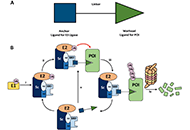 Current strategies for the design of PROTAC linkers: a critical reviewOpen AccessReviewPROteolysis TArgeting Chimeras (PROTACs) are heterobifunctional molecules consisting of two ligands; an “anchor” to bind to an E3 ubiquitin ligase and a “warhead” [...] Read more.Robert I. Troup ... Matthias G. J. BaudPublished: October 30, 2020 Explor Target Antitumor Ther. 2020;1:273–312
Current strategies for the design of PROTAC linkers: a critical reviewOpen AccessReviewPROteolysis TArgeting Chimeras (PROTACs) are heterobifunctional molecules consisting of two ligands; an “anchor” to bind to an E3 ubiquitin ligase and a “warhead” [...] Read more.Robert I. Troup ... Matthias G. J. BaudPublished: October 30, 2020 Explor Target Antitumor Ther. 2020;1:273–312
DOI: https://doi.org/10.37349/etat.2020.00018
This article belongs to the special issue Proteolysis Targeting Chimera (PROTAC)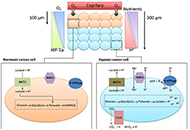 The impact of tumour pH on cancer progression: strategies for clinical interventionOpen AccessReviewDysregulation of cellular pH is frequent in solid tumours and provides potential opportunities for therapeutic intervention. The acidic microenvironment within a tumour can promote migration, invasi [...] Read more.Carol Ward ... Simon P LangdonPublished: April 28, 2020 Explor Target Antitumor Ther. 2020;1:71–100
The impact of tumour pH on cancer progression: strategies for clinical interventionOpen AccessReviewDysregulation of cellular pH is frequent in solid tumours and provides potential opportunities for therapeutic intervention. The acidic microenvironment within a tumour can promote migration, invasi [...] Read more.Carol Ward ... Simon P LangdonPublished: April 28, 2020 Explor Target Antitumor Ther. 2020;1:71–100
DOI: https://doi.org/10.37349/etat.2020.00005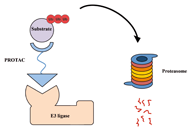 Novel approaches for the rational design of PROTAC linkersOpen AccessReviewProteolysis targeting chimeras (PROTACs) represent a promising class of hetero-bivalent molecules that facilitate ubiquitination of a target protein by simultaneously binding and bringing together b [...] Read more.Almaz Zagidullin ... Emil BulatovPublished: October 30, 2020 Explor Target Antitumor Ther. 2020;1:381–390
Novel approaches for the rational design of PROTAC linkersOpen AccessReviewProteolysis targeting chimeras (PROTACs) represent a promising class of hetero-bivalent molecules that facilitate ubiquitination of a target protein by simultaneously binding and bringing together b [...] Read more.Almaz Zagidullin ... Emil BulatovPublished: October 30, 2020 Explor Target Antitumor Ther. 2020;1:381–390
DOI: https://doi.org/10.37349/etat.2020.00023
This article belongs to the special issue Proteolysis Targeting Chimera (PROTAC)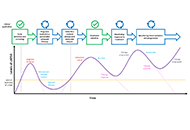 Diagnostic value of liquid biopsy in the era of precision medicine: 10 years of clinical evidence in cancerOpen AccessReviewLiquid biopsy is a diagnostic repeatable test, which in last years has emerged as a powerful tool for profiling cancer genomes in real-time with minimal invasiveness and tailoring oncological decisi [...] Read more.Vincenza Caputo ... Stefania NapolitanoPublished: February 28, 2023 Explor Target Antitumor Ther 2023;4:102–138
Diagnostic value of liquid biopsy in the era of precision medicine: 10 years of clinical evidence in cancerOpen AccessReviewLiquid biopsy is a diagnostic repeatable test, which in last years has emerged as a powerful tool for profiling cancer genomes in real-time with minimal invasiveness and tailoring oncological decisi [...] Read more.Vincenza Caputo ... Stefania NapolitanoPublished: February 28, 2023 Explor Target Antitumor Ther 2023;4:102–138
DOI: https://doi.org/10.37349/etat.2023.00125
This article belongs to the special issue The Implementation of Liquid Biopsy in Clinical Practice for Different Solid Tumor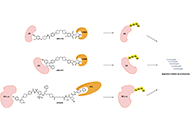 The clinical advances of proteolysis targeting chimeras in oncologyOpen AccessReviewProteolysis targeting chimeras (PROTACs) are a class of small molecules designed to target proteins for degradation. Their novel and unique modes of action provide PROTACs with the potential for the [...] Read more.Hao Xie ... Jason B. FlemingPublished: December 31, 2021 Explor Target Antitumor Ther. 2021;2:511–521
The clinical advances of proteolysis targeting chimeras in oncologyOpen AccessReviewProteolysis targeting chimeras (PROTACs) are a class of small molecules designed to target proteins for degradation. Their novel and unique modes of action provide PROTACs with the potential for the [...] Read more.Hao Xie ... Jason B. FlemingPublished: December 31, 2021 Explor Target Antitumor Ther. 2021;2:511–521
DOI: https://doi.org/10.37349/etat.2021.00061
This article belongs to the special issue Proteolysis Targeting Chimera (PROTAC)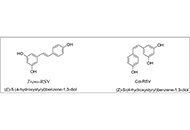 Potential role of resveratrol and its nano-formulation as anti-cancer agentOpen AccessReviewThe uncontrolled and metastatic nature of cancer makes it worse and more unpredictable. Hence, many therapy and medication are used to control and treat cancer. However, apart from this, many medica [...] Read more.Akshay Kumar ... Dilpreet SinghPublished: October 31, 2022 Explor Target Antitumor Ther. 2022;3:643–658
Potential role of resveratrol and its nano-formulation as anti-cancer agentOpen AccessReviewThe uncontrolled and metastatic nature of cancer makes it worse and more unpredictable. Hence, many therapy and medication are used to control and treat cancer. However, apart from this, many medica [...] Read more.Akshay Kumar ... Dilpreet SinghPublished: October 31, 2022 Explor Target Antitumor Ther. 2022;3:643–658
DOI: https://doi.org/10.37349/etat.2022.00105
This article belongs to the special issue Plant Extracts as an Infinite Resource for New Anticancer Agents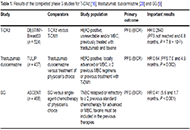 New antibody-drug conjugates (ADCs) in breast cancer—an overview of ADCs recently approved and in later stages of developmentOpen AccessReviewAntibody-drug conjugates (ADCs) have changed the treatment of breast cancer (BC) in more recent years. BC is a heterogenous group of malignancies with a broad range of histopathological characterist [...] Read more.Kira-Lee Koster ... Markus JoergerPublished: February 24, 2022 Explor Target Antitumor Ther. 2022;3:27–36
New antibody-drug conjugates (ADCs) in breast cancer—an overview of ADCs recently approved and in later stages of developmentOpen AccessReviewAntibody-drug conjugates (ADCs) have changed the treatment of breast cancer (BC) in more recent years. BC is a heterogenous group of malignancies with a broad range of histopathological characterist [...] Read more.Kira-Lee Koster ... Markus JoergerPublished: February 24, 2022 Explor Target Antitumor Ther. 2022;3:27–36
DOI: https://doi.org/10.37349/etat.2022.00069
This article belongs to the special issue Antibody-Drug Conjugates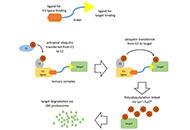 Development of PROTACs to address clinical limitations associated with BTK-targeted kinase inhibitorsOpen AccessReviewChronic lymphocytic leukemia is a common form of leukemia and is dependent on growth-promoting signaling via the B-cell receptor. The Bruton tyrosine kinase (BTK) is an important mediator of B-cell [...] Read more.Rachael Arthur ... Graham PackhamPublished: June 29, 2020 Explor Target Antitumor Ther. 2020;1:131–152
Development of PROTACs to address clinical limitations associated with BTK-targeted kinase inhibitorsOpen AccessReviewChronic lymphocytic leukemia is a common form of leukemia and is dependent on growth-promoting signaling via the B-cell receptor. The Bruton tyrosine kinase (BTK) is an important mediator of B-cell [...] Read more.Rachael Arthur ... Graham PackhamPublished: June 29, 2020 Explor Target Antitumor Ther. 2020;1:131–152
DOI: https://doi.org/10.37349/etat.2020.00009
This article belongs to the special issue Proteolysis Targeting Chimera (PROTAC)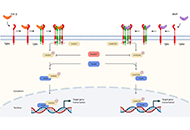 Transforming growth factor-β signaling: from tumor microenvironment to anticancer therapyOpen AccessReviewTransforming growth factor-β (TGF-β) signaling is an important pathway for promoting the pathogenesis of inflammatory diseases, including cancer. The roles of TGF-β signaling are heterogeneous and versatile in cancer developmen [...] Read more.Max Kam-Kwan Chan ... Patrick Ming-Kuen TangPublished: April 28, 2023 Explor Target Antitumor Ther. 2023;4:316–343
Transforming growth factor-β signaling: from tumor microenvironment to anticancer therapyOpen AccessReviewTransforming growth factor-β (TGF-β) signaling is an important pathway for promoting the pathogenesis of inflammatory diseases, including cancer. The roles of TGF-β signaling are heterogeneous and versatile in cancer developmen [...] Read more.Max Kam-Kwan Chan ... Patrick Ming-Kuen TangPublished: April 28, 2023 Explor Target Antitumor Ther. 2023;4:316–343
DOI: https://doi.org/10.37349/etat.2023.00137
This article belongs to the special issue Cancer Immunotherapy and Tumor Microenvironment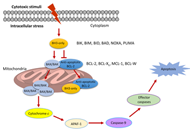 PROTACs are effective in addressing the platelet toxicity associated with BCL-XL inhibitorsOpen AccessReviewBCL-XL is an anti-apoptotic protein that plays an important role in tumorigenesis, metastasis, and intrinsic or therapy-induced cancer drug resistance. More recently, BCL-XL has also been identified [...] Read more.Peiyi Zhang ... Guangrong ZhengPublished: August 31, 2020 Explor Target Antitumor Ther. 2020;1:259–272
PROTACs are effective in addressing the platelet toxicity associated with BCL-XL inhibitorsOpen AccessReviewBCL-XL is an anti-apoptotic protein that plays an important role in tumorigenesis, metastasis, and intrinsic or therapy-induced cancer drug resistance. More recently, BCL-XL has also been identified [...] Read more.Peiyi Zhang ... Guangrong ZhengPublished: August 31, 2020 Explor Target Antitumor Ther. 2020;1:259–272
DOI: https://doi.org/10.37349/etat.2020.00017
This article belongs to the special issue Proteolysis Targeting Chimera (PROTAC)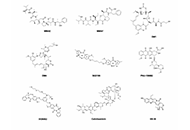 Antibody-drug conjugates for lymphoma patients: preclinical and clinical evidencesOpen AccessReviewAntibody-drug conjugates (ADCs) are a recent, revolutionary approach for malignancies treatment, designed to provide superior efficacy and specific targeting of tumor cells, compared to systemic cyt [...] Read more.Marilia Barreca ... Francesco BertoniPublished: December 26, 2022 Explor Target Antitumor Ther. 2022;3:763–794
Antibody-drug conjugates for lymphoma patients: preclinical and clinical evidencesOpen AccessReviewAntibody-drug conjugates (ADCs) are a recent, revolutionary approach for malignancies treatment, designed to provide superior efficacy and specific targeting of tumor cells, compared to systemic cyt [...] Read more.Marilia Barreca ... Francesco BertoniPublished: December 26, 2022 Explor Target Antitumor Ther. 2022;3:763–794
DOI: https://doi.org/10.37349/etat.2022.00112
This article belongs to the special issue Antibody-Drug Conjugates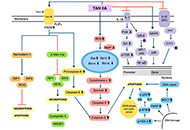 An overview of the anti-cancer actions of Tanshinones, derived from Salvia miltiorrhiza (Danshen)Open AccessReviewTanshinone is a herbal medicinal compound described in Chinese medicine, extracted from the roots of Salvia miltiorrhiza (Danshen). This family of compounds, including Tanshinone IIA and Tanshinone [...] Read more.Irum Naz ... Kwang Seok AhnPublished: June 29, 2020 Explor Target Antitumor Ther. 2020;1:153–170
An overview of the anti-cancer actions of Tanshinones, derived from Salvia miltiorrhiza (Danshen)Open AccessReviewTanshinone is a herbal medicinal compound described in Chinese medicine, extracted from the roots of Salvia miltiorrhiza (Danshen). This family of compounds, including Tanshinone IIA and Tanshinone [...] Read more.Irum Naz ... Kwang Seok AhnPublished: June 29, 2020 Explor Target Antitumor Ther. 2020;1:153–170
DOI: https://doi.org/10.37349/etat.2020.00010
This article belongs to the special issue Targeting Transcription Factors for Cancer Therapy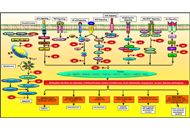 Potential of guggulsterone, a farnesoid X receptor antagonist, in the prevention and treatment of cancerOpen AccessReviewCancer is one of the most dreadful diseases in the world with a mortality of 9.6 million annually. Despite the advances in diagnosis and treatment during the last couple of decades, it still remains [...] Read more.Sosmitha Girisa ... Ajaikumar B. KunnumakkaraPublished: October 30, 2020 Explor Target Antitumor Ther. 2020;1:313–342
Potential of guggulsterone, a farnesoid X receptor antagonist, in the prevention and treatment of cancerOpen AccessReviewCancer is one of the most dreadful diseases in the world with a mortality of 9.6 million annually. Despite the advances in diagnosis and treatment during the last couple of decades, it still remains [...] Read more.Sosmitha Girisa ... Ajaikumar B. KunnumakkaraPublished: October 30, 2020 Explor Target Antitumor Ther. 2020;1:313–342
DOI: https://doi.org/10.37349/etat.2020.00019
This article belongs to the special issue Targeting Transcription Factors for Cancer Therapy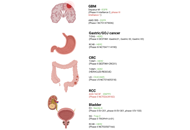 Antibody-drug conjugates: beyond current approvals and potential future strategiesOpen AccessReviewThe recent approvals for antibody-drug conjugates (ADCs) in multiple malignancies in recent years have fuelled the ongoing development of this class of drugs. These novel agents combine the benefits [...] Read more.Siddharth Menon ... Hui K. GanPublished: April 28, 2022 Explor Target Antitumor Ther. 2022;3:252–277
Antibody-drug conjugates: beyond current approvals and potential future strategiesOpen AccessReviewThe recent approvals for antibody-drug conjugates (ADCs) in multiple malignancies in recent years have fuelled the ongoing development of this class of drugs. These novel agents combine the benefits [...] Read more.Siddharth Menon ... Hui K. GanPublished: April 28, 2022 Explor Target Antitumor Ther. 2022;3:252–277
DOI: https://doi.org/10.37349/etat.2022.00082
This article belongs to the special issue Antibody-Drug Conjugates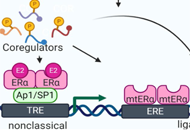 Role of estrogen receptor coregulators in endocrine resistant breast cancerOpen AccessReviewBreast cancer (BC) is the most ubiquitous cancer in women. Approximately 70–80% of BC diagnoses are positive for estrogen receptor (ER) alpha (ERα). The steroid ho [...] Read more.Kristin A. Altwegg, Ratna K. VadlamudiPublished: August 30, 2021 Explor Target Antitumor Ther. 2021;2:385–400
Role of estrogen receptor coregulators in endocrine resistant breast cancerOpen AccessReviewBreast cancer (BC) is the most ubiquitous cancer in women. Approximately 70–80% of BC diagnoses are positive for estrogen receptor (ER) alpha (ERα). The steroid ho [...] Read more.Kristin A. Altwegg, Ratna K. VadlamudiPublished: August 30, 2021 Explor Target Antitumor Ther. 2021;2:385–400
DOI: https://doi.org/10.37349/etat.2021.00052
This article belongs to the special issue Endocrine Resistant Breast Cancer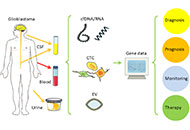 Liquid biopsy and glioblastomaOpen AccessReviewGlioblastoma is the most common and malignant primary brain tumor. Despite a century of research efforts, the survival of patients has not significantly improved. Currently, diagnosis is based on ne [...] Read more.Robert H. Eibl, Markus SchneemannPublished: February 25, 2023 Explor Target Antitumor Ther. 2023;4:28–41
Liquid biopsy and glioblastomaOpen AccessReviewGlioblastoma is the most common and malignant primary brain tumor. Despite a century of research efforts, the survival of patients has not significantly improved. Currently, diagnosis is based on ne [...] Read more.Robert H. Eibl, Markus SchneemannPublished: February 25, 2023 Explor Target Antitumor Ther. 2023;4:28–41
DOI: https://doi.org/10.37349/etat.2023.00121
This article belongs to the special issue Theranostic Frontiers in Neuro-Oncology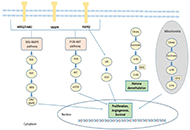 Genomic alterations in cholangiocarcinoma: clinical significance and relevance to therapyOpen AccessReviewImproving the survival of patients with cholangiocarcinoma (CCA) has long proved challenging, although the treatment of this disease nowadays is on advancement. The historical invariability of survi [...] Read more.Marianeve Carotenuto ... Nicola NormannoPublished: April 26, 2022 Explor Target Antitumor Ther. 2022;3:200–223
Genomic alterations in cholangiocarcinoma: clinical significance and relevance to therapyOpen AccessReviewImproving the survival of patients with cholangiocarcinoma (CCA) has long proved challenging, although the treatment of this disease nowadays is on advancement. The historical invariability of survi [...] Read more.Marianeve Carotenuto ... Nicola NormannoPublished: April 26, 2022 Explor Target Antitumor Ther. 2022;3:200–223
DOI: https://doi.org/10.37349/etat.2022.00079
This article belongs to the special issue Precision Medicine for Cholangiocarcinoma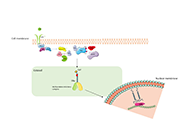 Role of PI3K/Akt/mTOR pathway in mediating endocrine resistance: concept to clinicOpen AccessReviewThe majority of breast cancers express the estrogen receptor (ER) and for this group of patients, endocrine therapy is the cornerstone of systemic treatment. However, drug resistance is common and a [...] Read more.Aglaia Skolariki ... Simon LordPublished: April 24, 2022 Explor Target Antitumor Ther. 2022;3:172–199
Role of PI3K/Akt/mTOR pathway in mediating endocrine resistance: concept to clinicOpen AccessReviewThe majority of breast cancers express the estrogen receptor (ER) and for this group of patients, endocrine therapy is the cornerstone of systemic treatment. However, drug resistance is common and a [...] Read more.Aglaia Skolariki ... Simon LordPublished: April 24, 2022 Explor Target Antitumor Ther. 2022;3:172–199
DOI: https://doi.org/10.37349/etat.2022.00078
This article belongs to the special issue Endocrine Resistant Breast Cancer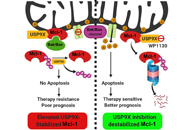 Myeloid cell leukemia-1: a formidable barrier to anticancer therapeutics and the quest of targeting itOpen AccessReviewThe antiapoptotic B cell lymphoma-2 (Bcl-2) family members are apical regulators of the intrinsic pathway of apoptosis that orchestrate mitochondrial outer membrane permeabilization (MOMP) through i [...] Read more.Prasad Sulkshane, Tanuja TeniPublished: May 24, 2022 Explor Target Antitumor Ther. 2022;3:278–296
Myeloid cell leukemia-1: a formidable barrier to anticancer therapeutics and the quest of targeting itOpen AccessReviewThe antiapoptotic B cell lymphoma-2 (Bcl-2) family members are apical regulators of the intrinsic pathway of apoptosis that orchestrate mitochondrial outer membrane permeabilization (MOMP) through i [...] Read more.Prasad Sulkshane, Tanuja TeniPublished: May 24, 2022 Explor Target Antitumor Ther. 2022;3:278–296
DOI: https://doi.org/10.37349/etat.2022.00083
This article belongs to the special issue The Role of Bcl-2 Family Proteins in Cancer Progression and Their Relevance to Cancer Therapy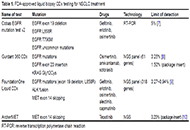 Clinical utility of liquid biopsy-based companion diagnostics in the non-small-cell lung cancer treatmentOpen AccessReviewRecently, technological advances in the detection and biological characterization of circulating tumor DNA (ctDNA) have enabled the implementation of liquid biopsy testing into clinical practice. Me [...] Read more.Yoshiharu SatoPublished: October 31, 2022 Explor Target Antitumor Ther. 2022;3:630–642
Clinical utility of liquid biopsy-based companion diagnostics in the non-small-cell lung cancer treatmentOpen AccessReviewRecently, technological advances in the detection and biological characterization of circulating tumor DNA (ctDNA) have enabled the implementation of liquid biopsy testing into clinical practice. Me [...] Read more.Yoshiharu SatoPublished: October 31, 2022 Explor Target Antitumor Ther. 2022;3:630–642
DOI: https://doi.org/10.37349/etat.2022.00104
This article belongs to the special issue The Implementation of Liquid Biopsy in Clinical Practice for Different Solid Tumor -
